SciBars
|
What do you know about Quantum Physics? You may have heard about being in two places at once, “spooky action at a distance”, “God playing dice”, entanglement and teleportation. What a strange theory, crazy physicists!
Quantum Theory is true, it has been tested over and over again. It is used in technology, and there are many amazing experiments around the world exploiting Nature’s guilty little secret. Whether scientists are watching molecules being waves and particles at the same time, making balls of ultra-cold levitated trapped atoms, trying to make things you can see be in two places at once, or even just sending your bank details 100% securely, they are using Quantum Physics. Have you ever seen a Quantum experiment? It’s likely not, and The Quantum Workshop team will show you real experiments that are used to probe the odd nature of this most enigmatic of theories, in an interactive way. Who knows, we may even find some new science on the way! |
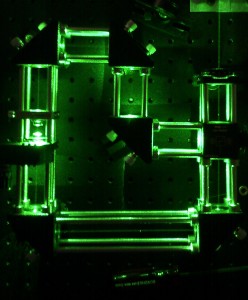 A preview? |
Date: Wednesday 12th September 2012
Time: 7pm, for a 7.30pm start
Place: Upstairs at The Lamb, 92 Lambs Conduit Street, WC1N 3LZ [gmap]
Cost: Free
An Optimist’s Tour Of The Future
|
Mark Stevenson has been to the future a few years ahead of the rest of us and thinks it could have a lot going for it. Based on his first book, he will take us on An Optimist’s Tour of the Future.
Mark combines two careers – one as a successful writer/comedian (writing for stage, radio and print) and another as an expert in future narratives, institutional innovation, engineered serendipity and learning – working with everyone from schoolchildren to the boards of multinational corporations. He is co-founder of Lea(r)n into the Curve, a fellow of the RSA, Nibmaster General at the Ministry of Stories, special advisor to the Virgin Earth Challenge and founder of the League of Pragmatic Optimists. |
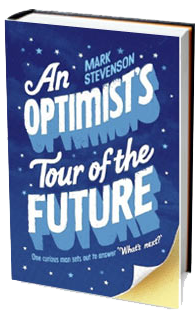 |
Date: Wednesday 22nd August 2012
Time: 7pm, for a 7.30pm start
Place: Upstairs at The Lamb, 92 Lambs Conduit Street, WC1N 3LZ [gmap]
Cost: Free
| Large scale aspects of the climate system are generally very well understood. This means that we can make good projections of things like temperature and wind patterns on a global and regional scale. However, when we want to look at the details things become more difficult; Dr. Russell’s research focuses on storms in a changing climate which is one of these tricky areas.
In this SciBar, we’ll have a look at the things we know very well – Climate science 19th Century style – and then bring things up to date to look at the way that we can begin to learn more about the details and particularly thinking about whether we are looking at a stormy future! Dr. Andy Russell is a lecturer in climate science at Brunel University, London. His research focuses on the European storm environment and Antarctic climate dynamics. He is an Associate Editor of Atmospheric Science Letters and a Fellow of Royal Meteorological Society. He often comments on weather and climate issues in the media. He can be found on Twitter or WordPress |
 Image Courtesy of NASA Image Courtesy of NASA |
Date: Wednesday 25th July 2012
Time: 7pm, for a 7.30pm start
Place: Upstairs at The Lamb, 92 Lambs Conduit Street, WC1N 3LZ [gmap]
Cost: Free
Photos from the night can be seen here on Flickr.
Click here to leave a comment about this event
| An Introduction to Anomalistic Psychology
Ever since records began, in every known society, a substantial proportion of the population has reported unusual experiences many of which we would today label as “paranormal”. Opinion polls show that the majority of the general public accepts that paranormal phenomena do occur. Such widespread experience of and belief in the paranormal can only mean one of two things. Either the paranormal is real, in which case this should be accepted by the wider scientific community which currently rejects such claims; or else belief in and experience of ostensibly paranormal phenomena can be fully explained in terms of psychological factors. Prof. Christopher French will provide an introduction to the sub-discipline of anomalistic psychology, which may be defined as the study of extraordinary phenomena of behaviour and experience, in an attempt to provide non-paranormal explanations in terms of known psychological and physical factors. This approach will be illustrated with examples relating to a range of ostensibly paranormal phenomena. |
 Taken by Joe Hall. |
Prof. French is the Head of the Anomalistic Psychology Research Unit in the Psychology Department at Goldsmiths College, University of London. He is a Fellow of the British Psychological Society and of the Committee for Skeptical Inquiry, as well as being a Distinguished Supporter of the British Humanist Association and a member of the Scientific Advisory Board of the British False Memory Society. He has published over 100 articles and chapters covering a wide range of topics within psychology. His main current area of research is the psychology of paranormal beliefs and anomalous experiences. He frequently appears on radio and television casting a sceptical eye over paranormal claims. He writes for The Skeptic and for the Guardian’s online science pages. Follow him on Twitter: @chriscfrench
Date: Wednesday 13th June 2012
Time: 7pm, for a 7.30pm start
Place: Upstairs at The Lamb, 92 Lambs Conduit Street, WC1N 3LZ [gmap]
Cost: Free
Photos from the night can be seen here on Flickr.
Ever wondered why you like the music you do? Or why that annoying song just won’t get out of your head? Do you want to know what Lady Gaga and The Stone Roses have in common or how laboratory equipment can be rendered musical genius?
| If you answered yes to any (or all) of those questions then come and join us on May 18th at the Chapel Bar in Islington when, for one night only, Science London will be delving into the science of music! Asking why our feet can’t help but tap to those infectious beats and how we can use music to communicate our ideas.
Martin Archer, resident Kiss FM DJ and Space Plasma Physicist will be using the latest club tunes (and fire!) to demonstrate the physics behind sound and explain how DJing can help to explain cutting edge areas of scientific research. Science communicator and internet phenomenon, Ben Good will be showing us how music can be used to convey complex scientific ideas before he takes to the stage with his blues band “The Lab Rats” to give us a practical demonstration. Then, after the learning part is done, Ed Drummond will take to the decks, spinning classic tunes into the early hours of your Saturday morning (vouging is strongly encouraged). |
 |
Date: Friday 18th May 2012
Time: 7:30pm till 2am
Place: The Chapel Bar, 29a Penton Street Greater London N1 9PX [gmap]
Cost:
Tickets on the door – LIMITED NUMBER £5 (entry only)
Photos from the night can be seen here.
10 ways to win a maths bet in the pub
| What’s the point of maths? To help you to win bets in the pub of course. The best bets are ones where your opponent thinks the odds are in his favour. Author and Broadcaster Rob Eastaway will be showing his favourite examples, ranging from the newspaper bet to ‘special’ poker where you choose the cards, and giving the audience a chance to win some money off him. | |
|
Rob Eastaway is best known for his bestselling books “Why do buses come in threes?” and “Maths for Mums & Dads”. He is Director of Maths Inspiration, a national programme of theatre-based lectures for teenagers, and is regularly to be heard on national radio talking about the maths of everyday life. He has given talks to just about every type of audience, ranging from the Edinburgh Fringe to the inmates of Pentonville Prison – and one thing that connects those audiences is that they all fancy a good bet. Date: Thursday 3rd May 2012 |
 Math wall by trindade.joao on Flickr |
Photos from the night can be seen here on Flickr.
Has Humanity Passed Its Sell-By Date?
|
Prof.Steve Fuller is the Auguste Comte Chair in Social Epistemology at the University of Warwick. Drawing on his new book, Humanity 2.0: What It Means to Be Human Past, Present and Future, he will consider the multiple sources of recent interest in the effects new philosophies, technologies and beliefs have on what it means to be human.
He will discuss how in some cases this interest in a ‘trans-‘ or ‘post-‘ human future lies in finding more scientifically adventurous means for realizing classically humanistic aims, but in other cases it is traceable to an abandonment of humanity as a category for understanding and even governing the world. Date: Wednesday 11th April 2012 |
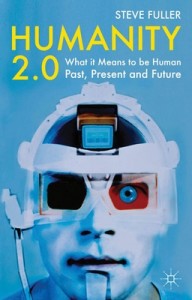
|
|
Dick Strawbridge has been in the army, contributed his expertise on engineering and environmental issues on TV and has the best moustache in showbiz. Currently based in Cornwall he aims to live as green a life as possible, using renewable energy and environmentally friendly resources. He will call on all of these experiences to discuss being a green engineer. Finishing his career in the army as a Lieutenant Colonel, he is best known for his TV work including Scrapheap Challenge and Coast as well as appearing alongside his family in It’s Not Easy Being Green. Date: Thursday 1st March 2012 |
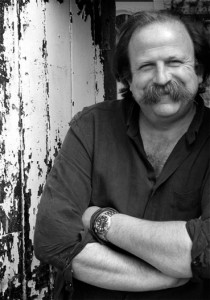
|
Photos from the night can be seen here on Flickr.
Click here to leave a comment about this event
|
We like to think of ourselves as rational creatures. We watch our backs, weigh the odds, pack an umbrella. But science suggests that most of us are more optimistic than realistic. In fact, optimism may be crucial to our existence.
Join Dr. Tali Sharot, a neuroscientist working at University College London, as she will take us on a tour of the irrationally positive brain. Tali will explain how the brain generates hope and what happens when it fails; how the brains of optimists and pessimists differ; why we are terrible at predicting what will make us happy; how emotions strengthen our ability to recollect; how anticipation and dread affect us; and how our optimistic illusions affect our financial, professional, and emotional decisions. Date: Thursday 26th January 2012 |
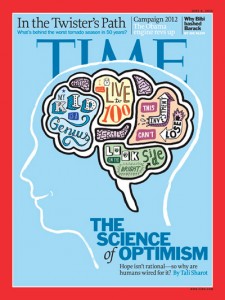
|
Photos from the night can be seen here on Flickr.
New technologies in joint replacements
Joint replacement surgery is becoming more common, with knees and hips replaced most often. These days it’s not just older generations that are undergoing joint replacement surgery. From cemented to cementless hip implants and metal-on-metal vs. metal-on-plastic implants, each has its advantages and disadvantages.
Join Dr Steven Cutts, doctor and freelance science writer, to explore the history of joint replacements and discuss the types of materials utilised and the commercial pressures to use certain devices. Steven will look at what’s in store for the future of joint replacements, such as the potential for computer navigated knees and hips; and the recent failure of the surface replacement hip implant that was recalled by DePuy.
Date: Wednesday 27th July
Time: 7pm, for a 7.30pm start
Place: Upstairs at The Lamb, 92 Lambs Conduit Street, WC1N 3LZ [gmap]
Cost: Free
Photos from the event can be seen here on Flickr
Click here to leave a comment about this event
« Previous Page — « Previous Entries Next Entries » — Next Page »
This site is powered by WordPress.
Science London was part of the British Science Association
